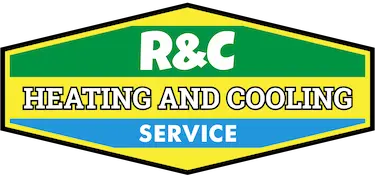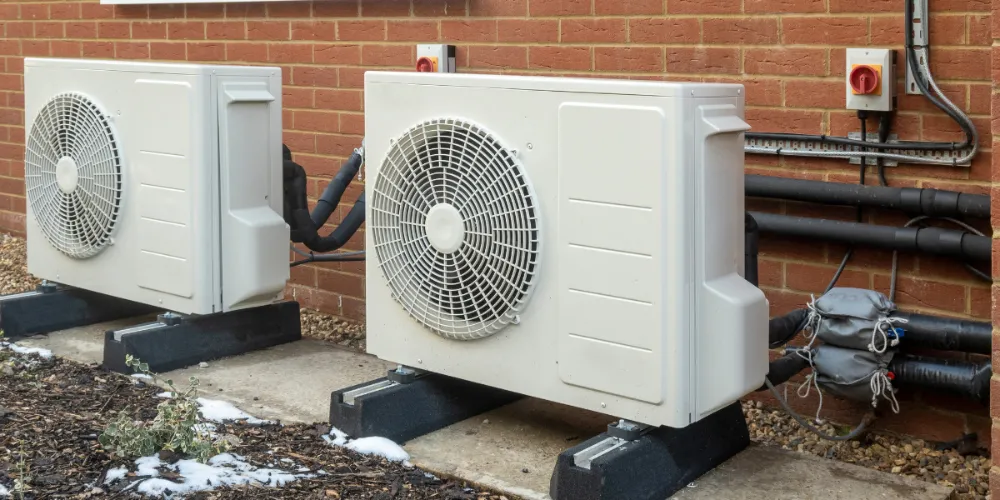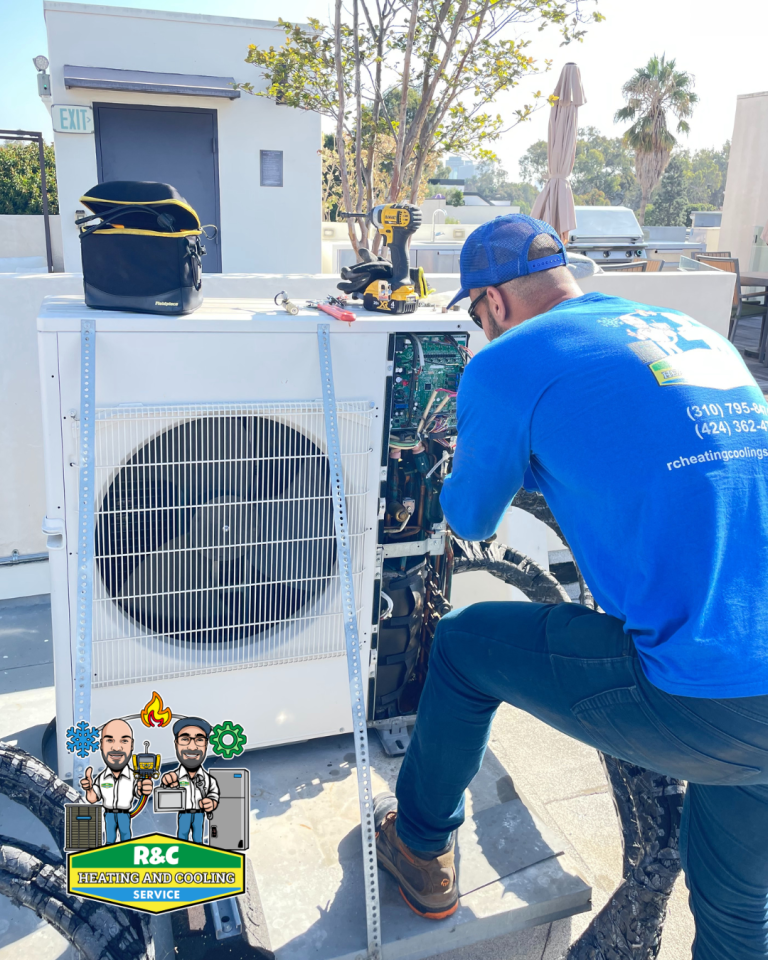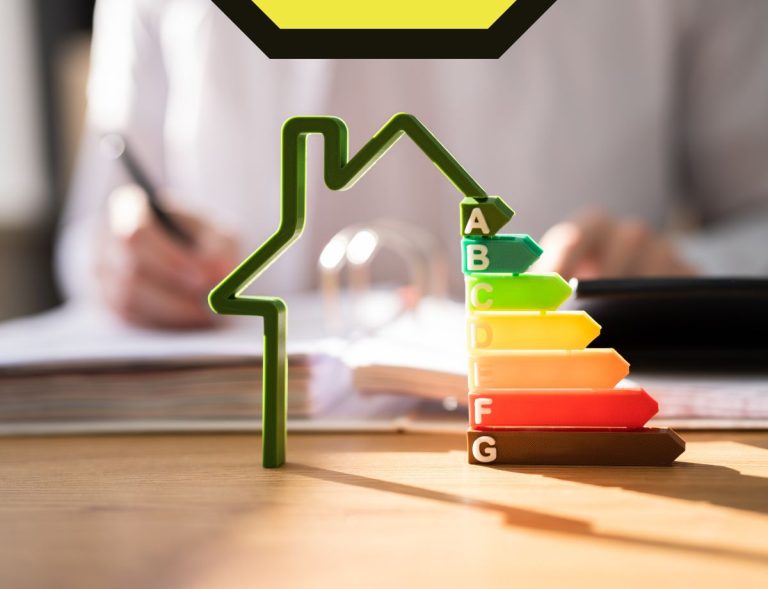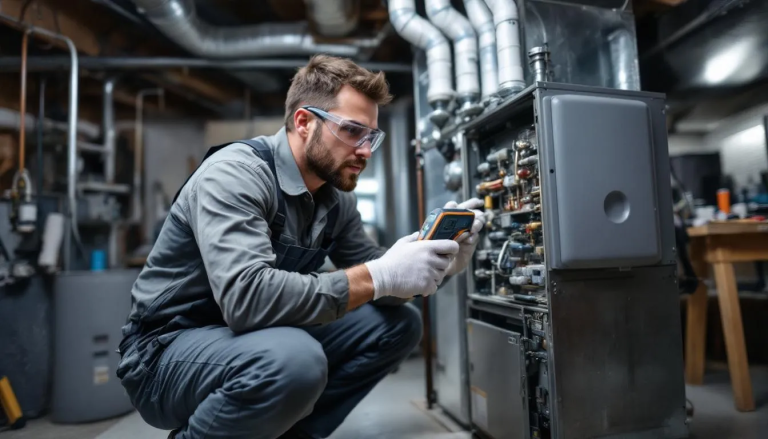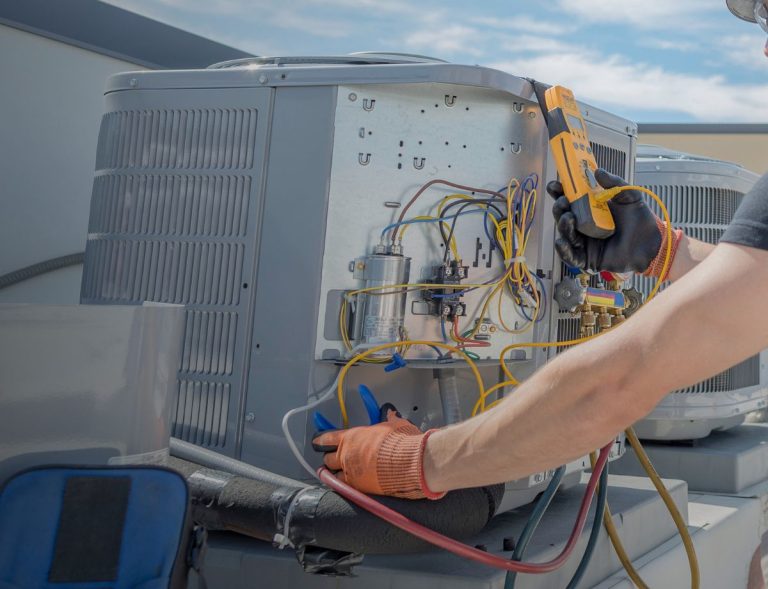Heat Pump Maintenance: What You Should Know
Heat pumps are now a common choice for people who want to heat and cool their homes efficiently. But, like any machinery, they need regular care to work well and last a long time.
In this article, we will look at heat pump maintenance. We will share important tips, common problems, and ways to avoid expensive repairs. Don’t wait until it’s too late. Take steps now to keep your heat pump working properly!
Key Takeaways
- Performing routine maintenance on your heat pump is crucial for improving energy efficiency, reducing repair and utility costs, and extending the system’s lifespan.
- Regularly change air filters, clean the outdoor unit, inspect ductwork for leaks, monitor refrigerant levels, and clear drainage lines to ensure optimal performance.
- Watch out for inconsistent temperatures, strange noises, increased energy bills, frequent cycling, and foul odors, as these could indicate the need for professional attention.
- Homeowners can handle simple tasks like changing filters, checking vents, and monitoring system performance, but professional help is essential for in-depth inspections and repairs.
- R & C Heating and Cooling Service offers expert heat pump maintenance, preventive maintenance plans, and emergency services to ensure your system is running efficiently.
Understanding Heat Pumps
Before we talk about proper maintenance, let’s quickly look at how heat pumps work. Heat pumps move heat from one location to another by using a refrigeration process. In winter, they take heat from the outside air, even when it’s chilly, and bring it inside.
In summer, the process switches. It takes heat out of your home and pushes it outside. This dual function makes heat pumps a good choice for managing temperature.
Different Types of Heat Pumps
Understanding the different kinds of heat pumps can help you know what care is needed.
- Air Source Heat Pumps: These are the most common type. They take heat from the air and are easy to install. They work well in most climates.
- Regularly change air filters, clean the outdoor unit, inspect ductwork for leaks, monitor refrigerant levels, and clear drainage lines to ensure optimal performance.
- Ground Source Heat Pumps: These systems take heat from the ground. The ground temperature stays steady all year. They usually cost more to install but can save more energy.
- Water Source Heat Pumps: These take heat from nearby water, like a lake or river. They are not as common but can work very well when set up properly.
Each type of heat pump has its own needs for care, but many basic rules for looking after heat pumps are the same for all.
Importance of Regular Maintenance
Regular maintenance is important for a few reasons:
- A heat pump that gets good care works better and uses less energy. The U.S. Department of Energy says regular check-ups can boost its performance by up to 25%.
- Taking care of your heat pump can make it last longer, saving you money on early replacements. With proper care, most heat pumps can work for up to 15 years. A neglected one might only last half that time.
- Good maintenance makes sure your heat pump keeps your home at a nice temperature all the time. This way, your family stays warm in the winter and cool in the summer.
- Checking your heat pump regularly can spot possible problems before they turn into major ones, cutting down on surprise breakdowns. This helps you avoid the stress of sudden failures.
- Regular care, like changing air filters, helps to make the air in your home healthier. It cuts down on dust, allergens, and other dirty things in the air.
Key Maintenance Tasks
To keep your heat pump in good shape, think about adding these important tasks to your routine maintenance:
1. Regular Filter Changes
One of the easiest and most important tasks is to change or clean the air filter often. Dirty filters can block air flow. This makes your heat pump work harder. It can use more energy and cause damage. Try to check your filter each month. Replace or clean it when you need to.
Tip: Write a schedule or set reminders on your phone to check your filters often. This simple step can help save energy!
2. Clean the Outdoor Unit
Your heat pump’s outdoor unit can collect dirt, leaves, and other stuff that begins to build up in outdoor coils. This can block air flow. Clean the area around the unit often and remove any debris you see. If you need to, gently rinse the fins with a garden hose. Just be sure not to use high pressure. This will help clear out dust and dirt.
Tip: Cut back any plants close to your unit so it gets good airflow. Think about putting on a cover during the seasons when it is not in use.
3. Inspect the Ductwork
Leaky or blocked ducts can greatly lower how well your heat pump works. Check your ductwork for any clear signs of wear or damage. Sealing leaks with duct tape or mastic can help air flow and save energy.
Tip: If your home is older, you should consider having a professional check the ducts. This will help make sure everything works well.
4. Check the Refrigerant Levels
Low refrigerant levels may show that there is a leak. This can stop your heat pump from moving heat. If you think your refrigerant levels are low, get in touch with a technician. They can check your system and add more refrigerant if needed.
Tip: Watching how your unit performs can help you find problems early. If it’s not heating or cooling well, feel free to ask for help.
5. Schedule Annual Professional Maintenance
While doing basic maintenance yourself is key, it’s also important to plan for annual maintenance by a professional. Technicians can give a full check-up, clean, and tune-up of your heat pump. This helps it run at its best. They can also find and fix problems that you might miss.
Tip: Many companies have yearly contracts that offer discounts and quick help. It’s a good choice for your home.
6. Monitor Thermostat Settings
Make sure your thermostat is set right for comfort and to save energy. A programmable thermostat lets you choose different temperatures at different times of the day. This helps reduce energy use when you are not home.
Tip: Use smart thermostats that understand your routine. They can change settings on their own to save energy while keeping you comfortable.
7. Clear Drainage Lines
Heat pumps create water when they work. This water must be removed. You should look at the drainage lines often. Make sure there are no blockages. It’s important that they work well. This can help stop water damage and mold from growing.
Tip: You can use a wet and dry vacuum to clear any blockages in the drain lines easily.
Signs Your Heat Pump Needs Attention
Noticing the signs of problems can help you avoid expensive repairs. Watch for these warning signs:
- Inconsistent Temperatures: If some rooms feel hotter or colder, your heat pump might be having problems. This could happen because of duct issues or a weak compressor.
- Strange Noises: Odd sounds like banging, clanking, or hissing can show there is a problem that needs quick fixing. Different sounds can mean different issues, so pay attention to them.
- Increased Energy Bills: A sudden rise in your energy bills could mean your heat pump is not working well. Keep an eye on your bills to notice any odd changes early.
- Frequent Cycling: If your heat pump is switching on and off a lot, this might show you have a problem that needs a professional to check. This can cause wear and tear, which can reduce the heat pump’s lifespan.
- Foul Odors: Any weird smells from your system could mean issues like burnt wires or mold. If you smell something strange, turn off your system and call for help right away.
DIY Maintenance Tips
While getting help from experts is important, there are several DIY tasks you can do by yourself:
- Change Filters: Changing or cleaning filters often is very important.
- Inspect Vents: Make sure that vents are not blocked by furniture or other things. Good airflow is important for how well it works.
- Check Settings: Regularly check that your thermostat settings are correct and working well.
- Monitor System Performance: Pay attention to how your system runs every day. If something seems wrong, it’s best to look into it quickly.
How R & C Heating and Cooling Service Can Help You
When you think about maintenance, having a reliable expert can really help. R&C Heating and Cooling Service focuses on good heat pump maintenance and repair. They offer skilled checks, cleaning, and fixes to keep your system working well.
Why You Should Choose R & C Heating and Cooling
- Expert Technicians: Their team has skilled workers who can find and fix problems quickly. They keep up with the latest tools and ways to maintain systems.
- Preventive Maintenance Plans: They provide plans that fit your needs in caring for your heat pump. These plans often include regular check-ups and fast service for emergencies.
- Customer Satisfaction: R&C Heating and Cooling works hard to give great service and make sure customers feel happy with what they do. They are proud of how reliable and good they are.
- Emergency Services: If your heat pump breaks down, R & C has emergency services to help you get it running again quickly. It’s good to know you have support when you need it.
- Transparent Pricing: R & C is open about pricing and talks clearly, so you know what you will pay. There are no hidden fees—just honest service.
Conclusion
Maintenance is important to make sure your system works well all year. By doing regular checks, spotting issues early, and getting help from experts like R&C Heating and Cooling Service, you can help your heat pump last longer. This way, your home stays comfortable.
Remember, ignoring upkeep can cause expensive repairs and poor performance. Don’t wait until it’s too late. Act now to protect your investment and make sure your heat pump runs well.
Regular care not only helps your system work well but also gives you peace of mind. You can feel good knowing that your home will be cozy no matter the season. With good attention, your heat pump can keep helping your family for many years. This makes your home a place of comfort and use.
If you have not booked your annual maintenance yet, now is the time! Call R&C Heating and Cooling at (424) 500-4542 to chat with our friendly team and set up an appointment today. Do not let small issues become big problems. Let us help you keep your home comfy all year long!
Frequently Asked Questions
Why is heat pump maintenance important?
Heat pump maintenance is crucial for improving energy efficiency, reducing repair costs, and extending the system’s lifespan. Regular care helps your heat pump perform better and ensures a comfortable home year-round.
What are the key maintenance tasks I should perform on my heat pump?
Key maintenance tasks include:
Regularly changing or cleaning air filters
Cleaning the outdoor unit
Inspecting ductwork for leaks
Checking refrigerant levels
Scheduling annual professional maintenance
Monitoring thermostat settings
Clearing drainage lines
How often should I change my air filter?
It’s recommended to check your air filter monthly and replace or clean it as needed. A dirty filter can block airflow and cause your heat pump to work harder, leading to increased energy use and potential damage.
What signs indicate that my heat pump needs attention?
Watch for these warning signs:
Inconsistent temperatures throughout the home
Strange noises like banging or hissing
Increased energy bills
Frequent cycling on and off
Foul odors coming from the unit
Can I perform heat pump maintenance myself?
Yes, homeowners can handle simple tasks like changing filters, inspecting vents, checking thermostat settings, and monitoring system performance. However, for in-depth inspections and repairs, it’s best to consult a professional.
